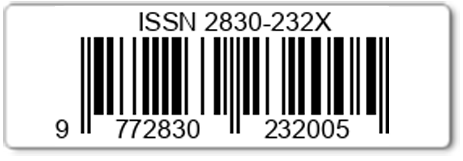Problematika Pembelajaran Daring Di SDN Jelapat Baru Kabupaten Barito Kuala
DOI:
https://doi.org/10.59086/jkip.v1i3.158Keywords:
Online Learning, Learning OutcomesAbstract
References
Abdul, & Sofyana. (2019). Pembelajaran Daring Kombinasi Berbasis Whatsapp Pada Kelas Karyawan Prodi Teknik Informatika Universitas PGRI Madiun. Jurnal Nasional Pendidikan Teknik Informatika, 8 (1), 8186.
Fatimah. (2011). Faktor Penentu Obyektivitas dan Kreativitas. Majalah Ilmiah. Edisi Maret-April 2011. Sekeretariat LPPM UNINDRA.
Hamalik, Oemar., (2009), Proses Belajar Mengajar. PT bumi Aksara, Jakarta
Imania, Kuntum An Nisa. (2019). Rancangan Pengembangan InStrumen Penilaian Pembelajaran Berbasis Daring. Jurnal IPTEK. Vol 5, 31-47
Isbaniah, F.dkk. (2020). Pedoman Pencegahan dan Pengendalian Corona Virus Disease (Covid-19). Direktorat Jenderal Pencegahan dan Pengendali Penyakit.
Kemendikbudristek. (2020). Surat Edaran Nomor 4 Tahun 2020 tentang Pelaksanaan Kebijakan Pendidikan dalam Masa Darurat Penyebaran Coronavirus Disease (COVID-19).
Lestari, W. (2015). Efektifitas Startegi Pembelajaran Dan Motivasi Belajar Terhadap Hasil Belajar Matematika. Formatif: Jurnal Ilmilah Pendidikan MIPA, 2(3).
Muhibbin Syah. (2007). Psikologi Pendidikan Dengan Pendekatan Baru. Bandung: PT Remaja Rosdakarya.
Purwanto, A., Pramono, R., Asbari, M., Hyun, C. C., Wijayanti, L. M., & Putri, R. S. (2020) Studi Eksploratif Dampak Pandemi COVID-19 Terhadap Proses Pembelajaran Online di Sekolah Dasar. EduPsyCouns: Journal of Education, Psychology and Counseling, 2(1), 1-12
Ramadhani, M. I., & Fuady, R. (2020). Peningkatan Keterampilan Menulis Karangan Dengan Menggunakan Media Gambar Berseri Pada Siswa Kelas III SDN Sungai Andai 1 Banjarmasin. Anterior Jurnal, 20(1), 34-39.
Sudjana, Nana. (2009). Penilaian Hasil Proses Belajar Mengajar. Bandung: PT. Remaja Rosdakarya.
Winkel, W.S.(2009).Psikologi Pengajaran. Jakarta : Gramedia.
Downloads
Published
How to Cite
Issue
Section
License
Copyright (c) 2022 Tut Wuri Handayani : Jurnal Keguruan dan Ilmu Pendidikan

This work is licensed under a Creative Commons Attribution 4.0 International License.
Tutwurihandayani Jurnal Ilmu Pendidikan
Publisher Lembaga Riset Ilmiah
© 2023

This work is licensed under a Creative Commons Attribution 4.0 International License.
Similar Articles
- Ahmad Fuadi, Rhadiatul Husna, Upaya Peningkatan Kecerdasan Emosional Dalam Pembelajaran Akidah Akhlak Melalui Strategi Pembelajaran Ekspositori Berbasis Online Pada Siswa Kelas VIII MTS An Nadia Lubuk Jaya , Tut Wuri Handayani : Jurnal Keguruan dan Ilmu Pendidikan: Vol. 1 No. 1 (2022): Maret 2022
- Satria Wiguna, Muhammad Yasin, Pengaruh Penggunaan Aplikasi Multi APP.V.1.0 Berbasis Online Terhadap Peningkatan Kompetensi Profesional Guru Pendidikan Agama Islam di SMA Negeri 1 Gebang , Tut Wuri Handayani : Jurnal Keguruan dan Ilmu Pendidikan: Vol. 1 No. 3 (2022): September 2022
You may also start an advanced similarity search for this article.


















